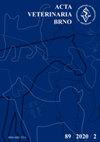2010-2019年捷克共和国赛马兴奋剂检查
IF 0.7
4区 农林科学
Q3 VETERINARY SCIENCES
引用次数: 0
摘要
本研究的目的是评估在给定的十年期间赛马兴奋剂控制的数据,主要是确定积极的发现,并总结建议,以防止意外污染的禁用物质,在适当的情况下。2010年至2019年捷克共和国赛马兴奋剂控制数据来自捷克共和国赛马会档案。每年在捷克共和国举行的比赛中,参赛马匹的总数、接受检测的马匹数量以及兴奋剂检查的结果都被确定下来。记录了样品类型、阳性发现和负责人关于阳性发现原因的陈述的数据。在监测期间,11,852匹马参加了捷克共和国的比赛,其中641匹马接受了兴奋剂检查。抽取了356匹马的血液作为检测样本,收集了285匹马的尿液。期间共检出吗啡、咖啡因、可可碱、磺化奥美拉唑、呋塞米、克仑特罗、去氯胺酮、利他酸、地塞米松、氟尼新、羟利多卡因和奥利帕平13例阳性,占641例阳性的2.03%。最常见的原因,共有七匹马,被确认为疑似饲料污染。因此,在我们的情况下,预防阳性兴奋剂结果应主要针对遵守适当的饲料和稳定的管理。本文章由计算机程序翻译,如有差异,请以英文原文为准。
Doping control in horses in the Czech Republic in 2010-2019
The aim of this study was to evaluate data on doping controls in racehorses over a given ten-year period, primarily to identify positive findings and to summarise recommendations for the prevention of accidental contamination with prohibited substances, where appropriate. Data on doping controls of racehorses in the Czech Republic from 2010 to 2019 were obtained from the archives of the Jockey Club of the Czech Republic. For each year, the total number of horses starting at races held in the Czech Republic, the number of horses tested, and the results of the doping controls were determined. Data on the type of samples, positive findings and statements from responsible persons about the cause of the positive finding were recorded. During the monitoring period, 11,852 horses competed in races in the Czech Republic and 641 of them underwent a doping control. Blood was taken from 356 horses as the sample for testing and urine was collected from 285 horses. A total of 13 positive findings (2.03% of the 641 tested) were found during the period, namely of morphine, caffeine, theobromine, omeprazole sulphide, furosemide, clenbuterol, norketamine, ritalinic acid, dexamethasone, flunixin, hydroxylidocaine and oripavine. The most common cause, in a total of seven horses, was confirmed as suspected feed contamination. Prevention of positive doping results in our circumstances should therefore be directed primarily towards compliance with proper feed and stable management.
求助全文
通过发布文献求助,成功后即可免费获取论文全文。
去求助
来源期刊

Acta Veterinaria Brno
农林科学-兽医学
CiteScore
1.00
自引率
33.30%
发文量
36
审稿时长
18-36 weeks
期刊介绍:
ACTA VETERINARIA BRNO is a scientific journal of the University of Veterinary and Pharmaceutical Sciences in Brno, Czech Republic.
The scientific journal Acta Veterinaria Brno is dedicated to the publication of original research findings and clinical observations in veterinary and biomedical sciences. Original scientific research articles reporting new and substantial contribution to veterinary science and original methods that have not been submitted for publication elsewhere are considered for publication. A written statement to this effect should accompany the manuscript, along with approval for publication by the author´s head of department. The authors bear full responsibility for the contents of their contribution. Book reviews are published, too.
 求助内容:
求助内容: 应助结果提醒方式:
应助结果提醒方式:


